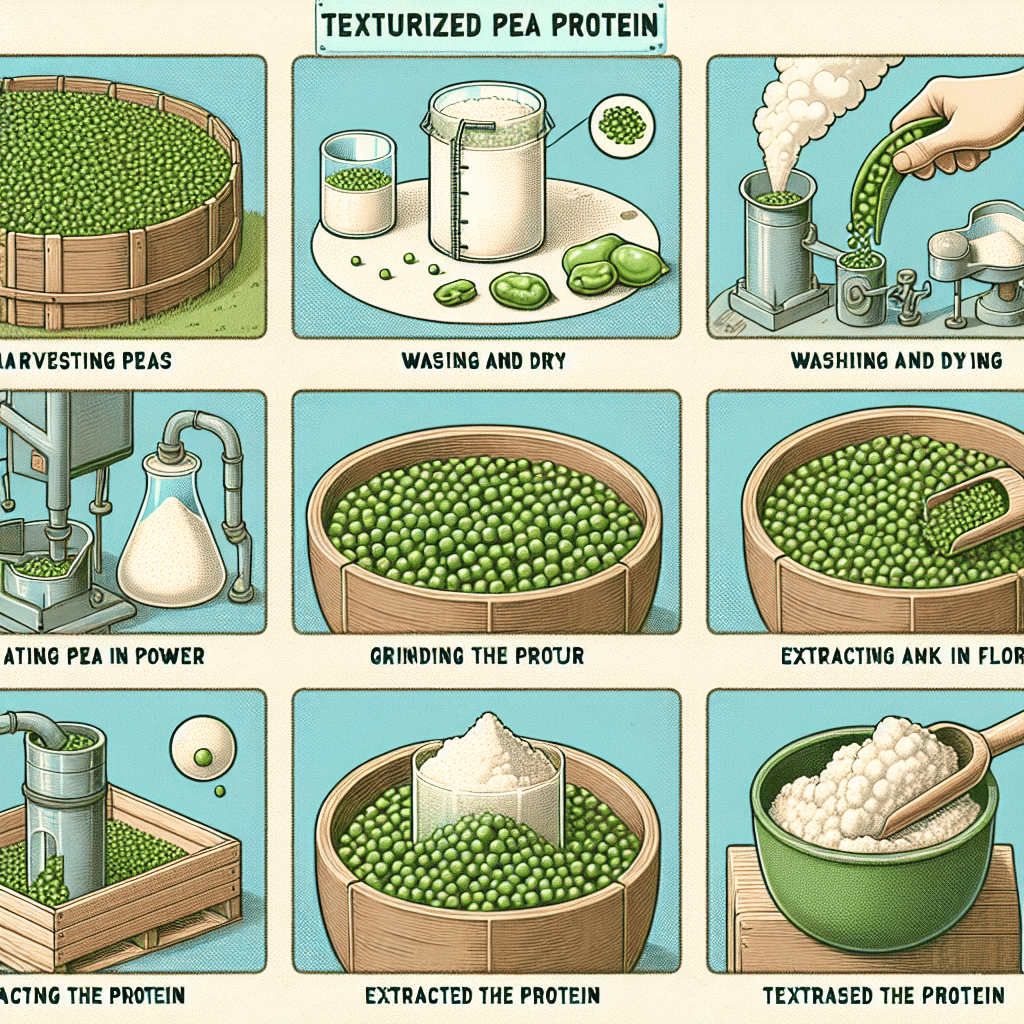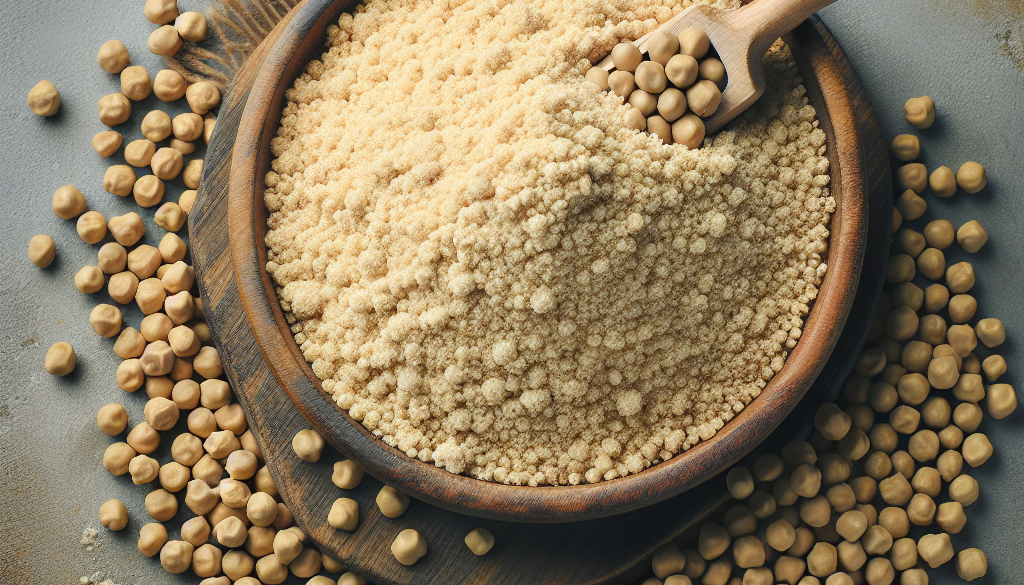What Is Texturized Pea Protein?
-
Table of Contents
- Texturized Pea Protein: A Comprehensive Guide
- Understanding Texturized Pea Protein
- The Benefits of Texturized Pea Protein
- Applications of Texturized Pea Protein
- Market Trends and Consumer Demand
- Challenges and Considerations
- Case Studies: Success Stories in Texturized Pea Protein
- Conclusion: The Future of Texturized Pea Protein
- Discover ETprotein’s Premium Protein Products
Texturized Pea Protein: A Comprehensive Guide

Texturized pea protein is emerging as a popular ingredient in the food industry, particularly within the realm of plant-based alternatives. This versatile protein source is not only nutritious but also environmentally friendly, making it an excellent choice for consumers looking to reduce their meat consumption without sacrificing texture or taste. In this article, we will delve into what texturized pea protein is, its benefits, applications, and why it’s becoming a staple in vegan and vegetarian diets.
Understanding Texturized Pea Protein
Texturized pea protein is derived from yellow peas, which are processed to remove the starch and fiber, leaving behind a concentrated protein substance. This protein is then texturized, a process that involves using heat and pressure to alter the protein’s structure, giving it a fibrous texture similar to that of meat. The result is a versatile ingredient that can be used in a variety of culinary applications.
The Benefits of Texturized Pea Protein
- Nutritional Value: Pea protein is rich in essential amino acids, making it a complete protein source. It’s also high in iron and BCAAs (branched-chain amino acids), which are crucial for muscle building and repair.
- Allergen-Friendly: Unlike soy or wheat-based proteins, pea protein is hypoallergenic, making it suitable for individuals with food sensitivities.
- Sustainability: Peas have a low environmental footprint, requiring less water and land to produce compared to animal proteins. They also fix nitrogen in the soil, reducing the need for synthetic fertilizers.
- Versatility: Texturized pea protein can be used in a wide range of products, from meat substitutes to protein bars, due to its ability to mimic the texture of meat.
Applications of Texturized Pea Protein
Texturized pea protein has found its way into numerous food products, offering a meat-like chewiness that appeals to both vegetarians and meat-eaters alike. Here are some common applications:
- Meat Alternatives: It’s a key ingredient in plant-based burgers, sausages, and minced meat, providing a similar texture to their meat counterparts.
- Protein Supplements: Pea protein is often used in protein powders and bars for its high protein content and digestibility.
- Dairy Alternatives: Its emulsifying properties make it suitable for vegan cheeses and yogurts.
- Baked Goods: It can enhance the protein content of bread, cookies, and pastries without altering their flavor.
Market Trends and Consumer Demand
The demand for texturized pea protein is on the rise, driven by the growing popularity of plant-based diets and the increasing awareness of the environmental impact of meat production. According to market research, the global pea protein market is expected to reach significant growth by the end of the decade, with texturized pea protein playing a substantial role in this expansion.
Challenges and Considerations
Despite its benefits, there are challenges in the production and acceptance of texturized pea protein. Flavor and texture are critical factors in consumer acceptance, and manufacturers are continuously working to improve these aspects. Additionally, the cost of production can be higher than traditional protein sources, although this is expected to decrease as technology advances and scales up.
Case Studies: Success Stories in Texturized Pea Protein
Several companies have successfully incorporated texturized pea protein into their products. For instance, Beyond Meat uses pea protein as a key ingredient in their plant-based burgers, which have gained widespread popularity for their meat-like taste and texture. Another example is Ripple Foods, which utilizes pea protein to create dairy-free milk that boasts the same creamy consistency as cow’s milk.
Conclusion: The Future of Texturized Pea Protein
Texturized pea protein is more than just a trend; it’s a sustainable, nutritious, and versatile ingredient that’s here to stay. With its numerous applications and benefits, it’s poised to play a significant role in the future of food production, catering to the growing demand for plant-based products. As technology improves and consumer awareness increases, we can expect to see even more innovative uses for this remarkable protein source.
Discover ETprotein’s Premium Protein Products
If you’re interested in exploring the benefits of texturized pea protein and other plant-based proteins, ETprotein offers a range of high-quality products. Their organic pea protein is characterized by a neutral taste, non-GMO, and allergen-free attributes, making it an excellent choice for various industries. Whether you’re a manufacturer, trader, or distributor, ETprotein can provide you with the protein solutions you need to meet the demands of your customers.
About ETprotein:
ETprotein, a reputable protein and L-(+)-Ergothioneine (EGT) Chinese factory manufacturer and supplier, is renowned for producing, stocking, exporting, and delivering the highest quality organic bulk vegan proteins and L-(+)-Ergothioneine. They include Organic rice protein, clear rice protein, pea protein, clear pea protein, watermelon seed protein, pumpkin seed protein, sunflower seed protein, mung bean protein, peanut protein, and L-(+)-Ergothioneine EGT Pharmaceutical grade, L-(+)-Ergothioneine EGT food grade, L-(+)-Ergothioneine EGT cosmetic grade, L-(+)-Ergothioneine EGT reference grade and L-(+)-Ergothioneine EGT standard. Their offerings, characterized by a neutral taste, non-GMO, allergen-free attributes, with L-(+)-Ergothioneine purity over 98%, 99%, cater to a diverse range of industries. They serve nutraceutical, pharmaceutical, cosmeceutical, veterinary, as well as food and beverage finished product distributors, traders, and manufacturers across Europe, USA, Canada, Australia, Thailand, Japan, Korea, Brazil, and Chile, among others.
ETprotein specialization includes exporting and delivering tailor-made protein powder and finished nutritional supplements. Their extensive product range covers sectors like Food and Beverage, Sports Nutrition, Weight Management, Dietary Supplements, Health and Wellness Products, and Infant Formula, ensuring comprehensive solutions to meet all your protein needs.
As a trusted company by leading global food and beverage brands and Fortune 500 companies, ETprotein reinforces China’s reputation in the global arena. For more information or to sample their products, please contact them and email sales(at)ETprotein.com today.














